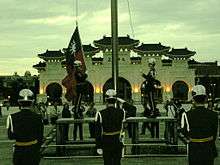National Flag Anthem of the Republic of China
The National Flag Anthem of the Republic of China (Chinese: 中華民國國旗歌; pinyin: Zhōnghuá Míngúo Gúoqígē), also unofficially known as the "National Banner Song", is a patriotic song typically played during the raising and lowering of the flag of the Republic of China, commonly known as Taiwan. Domestically, the flag anthem is typically played immediately following the National Anthem of the Republic of China during flag ceremonies. It is also played at international sporting events such as the World Baseball Classic and Olympic Games, where Taiwan participates officially under the name of Chinese Taipei. The song is thus considered to be effectively a secondary national anthem; Taiwanese citizens stand when it is performed and salute it as they would salute the national anthem.
| National Flag Anthem of the Republic of China | |
 The Sheet of National Flag Anthem | |
Flag anthem of Sporting anthem of | |
| Also known as | 中華臺北奧會會歌 (English: "Anthem of the Chinese Taipei Olympic Committee") 中華臺北國歌 (English: National Anthem of Chinese Taipei) |
|---|---|
| Lyrics | Disputed (usually attributed to Tai Chi-tao), 1937 |
| Music | Huáng Zì, 1936 |
| Adopted | 1937 (China) 1949 (Taiwan) |
| Audio sample | |
"National Flag Anthem of the Republic of China" (instrumental)
| |

Origin
After the Kuomintang Anthem became the de facto National Anthem of the Republic of China in 1930, the Ministry of Education had invited submissions for a new official national anthem. The music composed by Huang Tzu was eventually chosen in 1936, but the Nationalist Government refused to adopt it as the national anthem. As a compromise, the National Anthem remained unchanged, while Huang Tzu's music was adopted as the National Flag Anthem, with lyrics written in Classical Chinese by Tai Chi-tao, who had also contributed to the lyrics of the National Anthem.[1]
Use
Since 1983, the song (officially with different lyrics) was used at Olympic competitions instead of the National Anthem due to pressure from the Chinese Olympic Committee and the International Olympic Committee. This also changed the symbols used by Taiwan during the Olympics and another sporting and another events and their name officially changed to "Chinese Taipei."[2] During the 2004 Summer Olympics and 2017 Taipei Universiade, Chinese Taipei won its first gold medals, and the Banner Song was played at the ceremonial raising of the flag of the gold medal team. When introduced, the song is officially called the "National Anthem of Chinese Taipei."[3] However, in the 16th Asian Games held in Guangzhou, China, the song was introduced as the "Anthem of the Chinese Taipei Olympic Committee" (中華臺北奧會會歌), with new lyrics written by Zhang Bide (張彼德).[4][5] In schools and national monuments in Taiwan, the National Anthem and the National Flag Anthem are played every morning before classes or opening at an outdoor ceremony. The national anthem is sung while the flag is being held before raising and the National Flag Anthem is played when the National Flag is raised.[6]
During the 2017 Summer Universiade held in Taipei, Taiwan, the song was introduced as the "National Anthem of Chinese Taipei."
Lyrics

Original
| Traditional Chinese | Simplified Chinese |
|---|---|
山川壯麗,物產豐隆,炎黃世胄,東亞稱雄。 |
山川壮丽,物产丰隆,炎黄世胄,东亚称雄。 |
| Hanyu Pinyin | |
|---|---|
|
Shānchuān zhuànglì, wùchǎn fēng lóng; yánhuáng shì zhòu, dōngyǎ chēngxióng. |
| English translation |
|---|
|
Magnificent mountains and rivers, (with) bountiful and diverse goods; |
Dispute of the author of lyrics
According to Liu Yiling from the National Library of the Republic of China, there remains a dispute over the authorship of the lyrics. In some earlier publications, the lyrics were attributed as an anonymous work.[7] However, later publications attributed it to Tai Chi-tao, who did compose a song with the title "National Flag Anthem" in 1928. Nevertheless, that work was very different from the current version. In 1929, Liang Desuo published "Blue Sky, White Sun, and a Wholly Red Earth", and some attribute the authorship of the National Flag Anthem to him due to the resemblance between that work and the current lyrics.[7]
See also
| Historical Chinese anthems | ||||||||||||||
|---|---|---|---|---|---|---|---|---|---|---|---|---|---|---|
|
||||||||||||||
References
- Ming Pao Monthly, No.289, P.87
- 國旗歌歌詞遭篡改 蒙蔽26年? (in Chinese). 2009-01-05. Retrieved 2009-01-08.
- "NOC Biography - Chinese Taipei". The Beijing Organizing Committee for the Games of the XXIX Olympiad. 2008-08-25. Archived from the original on 2008-08-10. Retrieved 2009-01-08.
- 劉進枰 (2007). "1981年奧會模式簽訂之始末" (PDF). Archived from the original (PDF) on 2012-03-09. Retrieved 2010-07-04.
- "Chinese Taipei wins Soft tennis 2010". Youku. 2010-11-15. Retrieved 2010-11-15.
- 臺北市公私立各級學校升降旗典禮實施要點 (in Chinese). 1981-02-16. Archived from the original on 2011-08-10. Retrieved 2009-01-08.
- 梁得所與中華民國〈國旗歌〉的歌詞 劉怡伶 國家圖書館館刊 (PDF) (in Chinese). 2011-06-10. Retrieved 2012-08-07.
External links
- National Flag Anthem Orchestral Version Ministry of Foreign Affairs, Republic of China.
- National Flag Anthem Chorus Version Ministry of Foreign Affairs, Republic of China.
- National Flag Anthem of the Republic of China